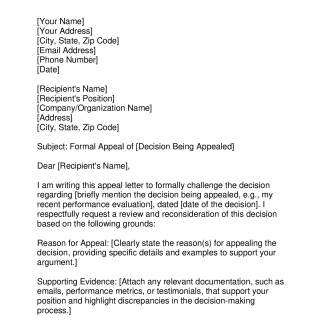Professional Appeal Letter
A professional appeal letter is a formal correspondence utilized to challenge decisions within the workplace. It serves to request a reassessment of a decision made by an organization, with the goal of achieving a different outcome. When crafting a professional appeal letter, it is crucial to address the following components:
Purpose:
- to challenge and request a review of a decision made within the organization.
Parts:
- Introduction,
- reasons for appeal,
- supporting evidence or documentation,
- persuasive argument,
- request for reconsideration, and closing.
Important Fields:
- sender's contact information,
- recipient's details, date,
- subject line,
- salutation.
Parties Involved:
- sender (individual writing the appeal)
- recipient (individual or committee responsible for reviewing the appeal).
Key Considerations:
- clarity in explaining reasons for the appeal,
- providing supporting evidence,
- maintaining a professional tone,
- emphasizing the desired outcome.
Required Data:
- details of the decision being appealed,
- reasons for disagreement,
- relevant background information,
- supporting documents (e.g., emails, performance reviews),
- proposed solutions.
Required Documents: Any pertinent evidence backing up the claims made in the letter, such as medical records, performance reports, or correspondence related to the decision being appealed.
Sample of Professional Appeal Letter
[Your Name][Your Address][City, State, Zip Code][Email Address][Phone Number][Date][Recipient's Name][Recipient's Position][Company/Organization Name][Address][City, State, Zip Code]Subject: Formal Appeal of [Decision Being Appealed]Dear [Recipient's Name],I am writing this appeal letter to formally challenge the decision regarding [briefly mention the decision being appealed, e.g., my recent performance evaluation], dated [date of the decision]. I respectfully request a review and reconsideration of this decision based on the following grounds:Reason for Appeal: [Clearly state the reason(s) for appealing the decision, providing specific details and examples to support your argument.]Supporting Evidence: [Attach any relevant documentation, such as emails, performance metrics, or testimonials, that support your position and highlight discrepancies in the decision-making process.]Persuasive Argument: [Present a compelling case for why the decision should be reconsidered, emphasizing the impact on you, the team, or the organization.]Request for Reconsideration: [Clearly state your desired outcome or proposed solution, highlighting how it aligns with the organization's objectives and values.]I believe that a reconsideration of this decision is crucial for maintaining fairness, transparency, and employee morale within the organization. I am confident that with a thorough review of the provided information, a more favorable resolution can be reached.I appreciate your time and attention to this matter and remain open to any further discussion or clarification needed. Please feel free to contact me at [Your Phone Number] or [Your Email Address] to schedule a meeting to discuss this appeal further.Thank you for your prompt attention to this appeal.Sincerely,[Your Name]
Strengths: Facilitates a formal avenue for addressing grievances and seeking a fair resolution.
Weaknesses: May not always guarantee a reversal of the initial decision.
Opportunities: Offers a chance to present additional information that could influence the outcome.
Threats: Inappropriate tone or lack of compelling evidence may weaken the appeal's effectiveness.
Application Examples:
- Employee appealing a performance review rating.
- Student challenging a disciplinary action taken by the educational institution.
Related Forms:
- Grievance letter,
- dispute resolution request,
- formal complaint letter.
Differences:
- Grievance letters focus more on expressing dissatisfaction or raising issues without requesting a specific reconsideration.
- Formal complaint letters typically outline grievances but may not always seek a formal review or reversal of a decision.
The letter is typically submitted to the appropriate department or individual within the organization responsible for handling appeals. It is advisable to keep a copy of the letter and any accompanying documents for record-keeping purposes.
The professional appeal letter plays a significant role in influencing the resolution of disputes or disagreements within professional settings, shaping the future outcomes and relationships of the involved parties.

